Module 12 Western music Unit 1 It’s so beautiful! 教学课件(共37张PPT)
文档属性
| 名称 | Module 12 Western music Unit 1 It’s so beautiful! 教学课件(共37张PPT) | 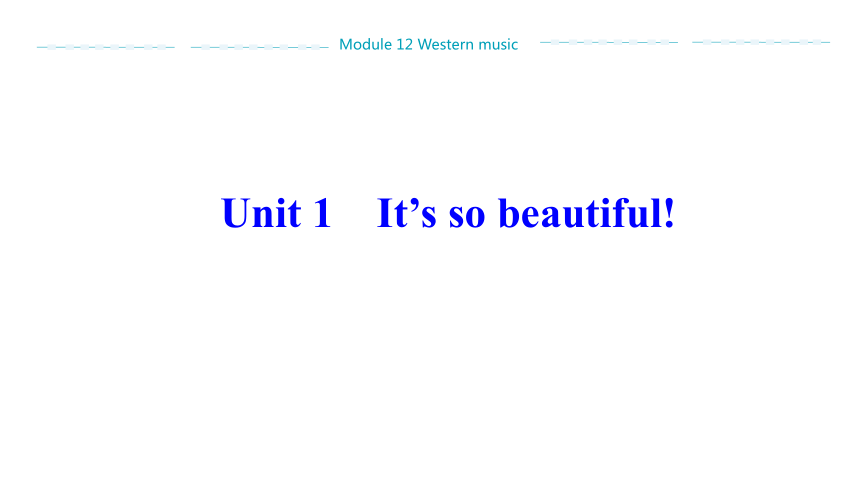 | |
| 格式 | ppt | ||
| 文件大小 | 5.1MB | ||
| 资源类型 | 教案 | ||
| 版本资源 | 外研版 | ||
| 科目 | 英语 | ||
| 更新时间 | 2020-02-16 09:07:10 | ||
图片预览


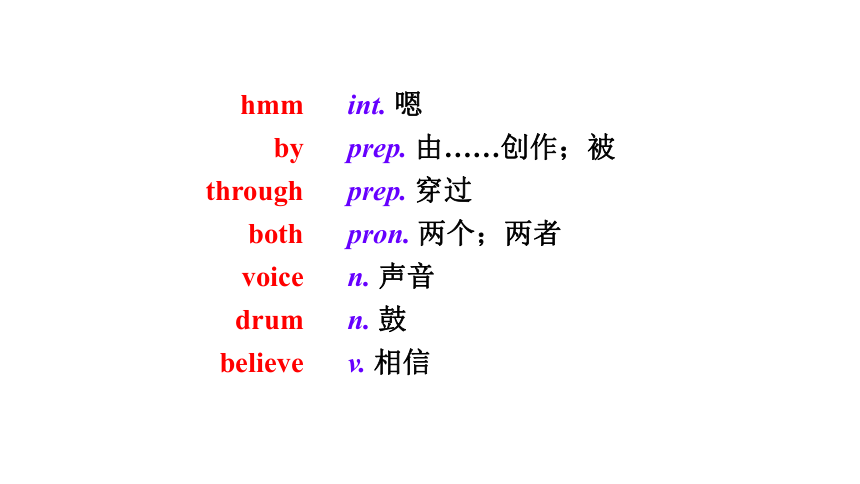
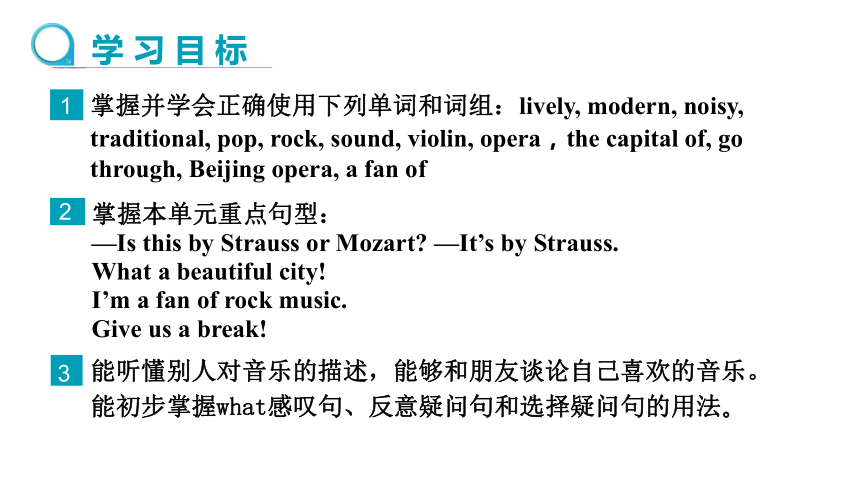



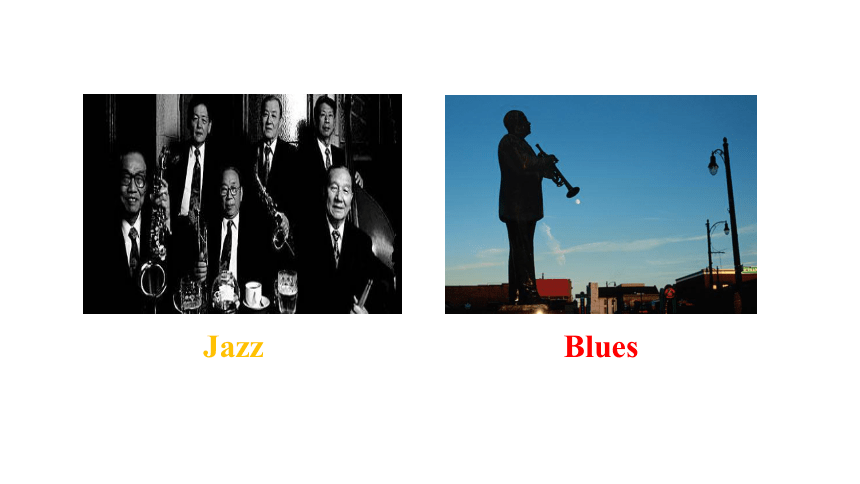
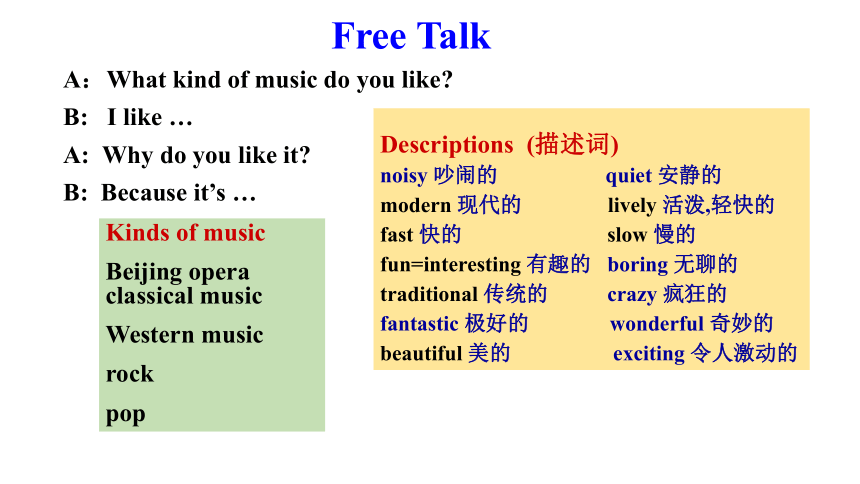

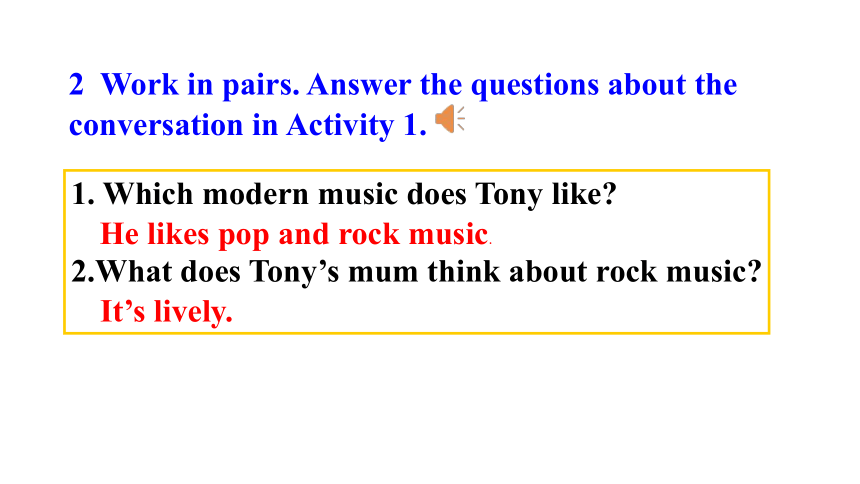
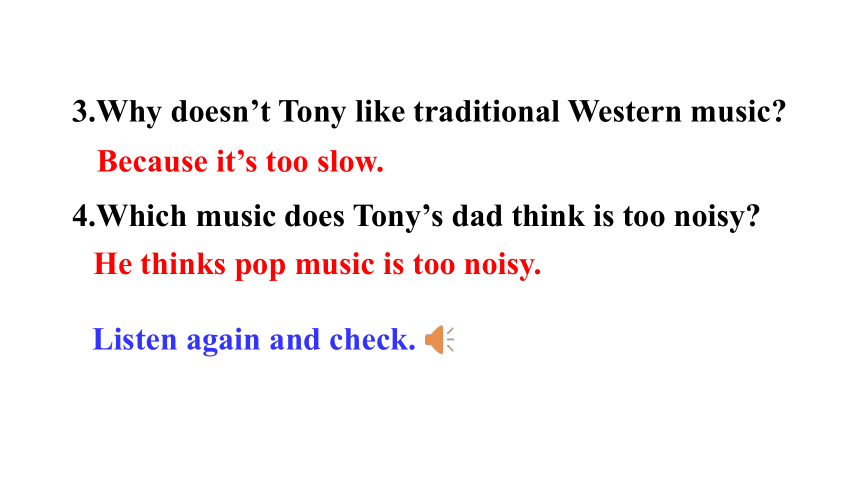
文档简介
(共37张PPT)
Unit 1 It’s so beautiful!
Module 12 Western music
Words and expressions
lively
modern
noisy
pop
rock
sound
violin
Western
adj. 活泼的,轻快地
adj. 现代的
adj. 吵闹的
adj. 流行的,受欢迎的
n. 摇滚乐;石头;岩石
n. 声音
n. 小提琴
adj. 西方的
hmm
by
through
both
voice
drum
believe
int. 嗯
prep. 由……创作;被
prep. 穿过
pron. 两个;两者
n. 声音
n. 鼓
v. 相信
学 习 目 标
掌握并学会正确使用下列单词和词组:lively, modern, noisy, traditional, pop, rock, sound, violin, opera,the capital of, go through, Beijing opera, a fan of
1
3
能听懂别人对音乐的描述,能够和朋友谈论自己喜欢的音乐。
能初步掌握what感叹句、反意疑问句和选择疑问句的用法。
掌握本单元重点句型:
—Is this by Strauss or Mozart —It’s by Strauss.
What a beautiful city!
I’m a fan of rock music.
Give us a break!
2
What kind of music do you know
课 堂 导 入
Classical music
Pop music
Rock
Opera
Jazz
Blues
A:What kind of music do you like
B: I like …
A: Why do you like it
B: Because it’s …
Descriptions (描述词)
noisy 吵闹的 quiet 安静的
modern 现代的 lively 活泼,轻快的
fast 快的 slow 慢的
fun=interesting 有趣的 boring 无聊的
traditional 传统的 crazy 疯狂的
fantastic 极好的 wonderful 奇妙的
beautiful 美的 exciting 令人激动的
Kinds of music
Beijing opera classical music
Western music
rock
pop
Free Talk
课 堂 学 习
Listening and vocabulary
1 Listen and number the words as you hear them.
( ) lively ( ) modern ( ) music
( ) noisy ( ) pop ( ) rock
( ) sound ( ) violin ( ) Western
1
2
3
4
5
6
7
8
9
2 Work in pairs. Answer the questions about the conversation in Activity 1.
Which modern music does Tony like
2.What does Tony’s mum think about rock music
He likes pop and rock music.
It’s lively.
3.Why doesn’t Tony like traditional Western music
4.Which music does Tony’s dad think is too noisy
Listen again and check.
Because it’s too slow.
He thinks pop music is too noisy.
Now check ( ) the true sentences.
3 Listen and read.
( ) 1. They’re listening to Western music.
( ) 2. Tony knows little about Strauss.
( ) 3. Strauss was born in the capital of Australia.
( ) 4. The Blue Danube is pop music.
( ) 5. Lingling enjoys Beijing opera very much.
√
√
√
√
Everyday English
What a beautiful city!
I’m a fan of rock music.
Give us a break!
I don’t believe it!
name music Tony Lingling Betty Daming
traditional Western music
Beijing opera
pop
rock
4 Check (√) the types of music the students like.
√
√
√
√
√
√
5 Complete the sentences with the correct form of the words from the box.
believe, both, drum
German, noisy, voice
Strauss wasn’t _________. He came from Austria.
Daming thinks the _______ in rock music are too ________.
German
drums
noisy
3. Tony can’t _______ that Daming
doesn’t like rock music.
4. Betty likes ______ traditional Western
music and pop music.
5. Tony thinks the sound of the _____ in
Beijing opera is very different.
believe
both
voice
6 Complete the sentences about yourself.
My favourite music is …
I like it because …
My parents like …
Pronunciation and speaking
7 Listen and read.
What a beautiful city!
It’s so beautiful!
I love his music!
Listen to this!
8 Work in pairs. Ask and answer questions about the music you like or don’t like.
— What music do you like
— I like pop. It’s lively and good to
dance to, but I don’t like rock. It’s
too noisy. What
about you
Language points
1.Western music, isn’t it
西方音乐,不是吗?
You listen to pop music, Lingling, don’t you
你听流行音乐,是吧,玲玲?
The sound is very … different, isn’t it
这种音乐很不同,不是吗?
以上这些句子中都包含反义疑问句。
反意疑问句
a. 含义
在一个陈述句之后附上一个简短的疑问句,对陈述句提出相反的疑问,这种疑问句叫反意疑问句。
如:
1) Lions are scary, aren’t they
2) We speak Chinese, don’t we
b. 结构:
结构一: 前肯 + 后否
eg. Lions are scary, aren’t they
狮子很恐怖,不是吗?
结构二: 前否 + 后肯
eg. Lions aren’t scary, are they
狮子不恐怖,对吧?
结构一: 前肯 + 后否
Be 动词:
1. You are an actor, __________
2. He is a good boy, ________
3. It was fine yesterday, _________
行为动词:
1. It often rains here, _________
2. He likes soccer, _________
3. You have a headache, _________
4. I called you yesterday, _______
aren’t you
isn’t he
wasn’t it
doesn’t it
doesn’t he
don’t you
didn’t I
结构二: 前否 + 后肯
1. You aren’t an actor, _________
2. He isn’t a good boy, ________
3. It wasn’t fine yesterday, ________
4. It doesn’t rain here, __________
5. His sister doesn’t have a headache,
_________
6. You didn’t call me yesterday,
___________
are you
is he
does it
does she
was it
did you
c. 在回答反义疑问句时,不管问题的提法如何,若事实是肯定的,就要用yes,事实是否定的,就要用no。这和汉语不一样,应特别注意。
You’re not ready, are you
你没有准备好,是吧?
Yes, I am. 不,我准备好了。
No, I’m not. 是的,我没有。
2.Is this by Strauss or Mozart
是由斯特劳斯还是莫扎特创作的?
by表示“由……作曲”,by短语用作be动词的表语
by还可根据句子翻译成“由……写的”“由……演唱”。
I like novels by Lu Xun.
我喜欢鲁迅写的小说。
3.It goes through Vienna.
它流经维也纳。
through 意为“穿过,经过”,常与pass, go, walk 等动词
连用。
He walked through me without saying
hello to me.
他从我身边经过,但是没和我打招呼。
across, through, over 三者都有“通过,穿过”之意。
区别是:
① across 表示从一定范围的一边到另一边,与on 有关,表示动作是在某一物体的表面进行的。
They walk across the road.
他们穿过公路。
② through 表示从中间通过,强调动We walk
through the forest.
我们穿过森林。
③ over 多指空间范围上通过,越过或垂直在上,和表面不接触等。
The birds fly over the city.
鸟儿飞过城市。
4.Listen to this fantastic voice.
voice此处用作名词,意为“嗓音,说话声,歌唱声”,它一般指人的声音,它也可用于指鸟类的鸣叫。如:It is very nice to hear your voice.听到你的声音真是太好了。
5.Give us a break!
break此处用作名词,意为“休息”,常构成固定短语take/have a break(休息一下)。如:I think we should take a break.我认为我们应该休息一下。
6. It's so noisy!
noisy作形容词,意为“吵闹的”,可用作表语或定语,其名词为noise(噪音)。如:Please turn off your radio.
It's too noisy.
请关掉你的收音机。太吵了。
7.I don't believe it!
believe此处用作及物动词,意为“相信”,其后可接
名词、代词或宾语从句等。短语:believe in信任,信赖。
believe的形容词为believable,意为“可信的”。
I believe you are right.我相信你是对的。
Many Westerners believe in god.
许多西方人信仰上帝。
课 堂 达 标
I.单项选择。
( )1. Tom works in a big foreign company,
A. does he B. doesn’t he
C. is Tom D. does Tom
( )2. Lingling went to the office yesterday,
A. was he B. is he
C. did he D. didn’t he
B
D
( )3. You’re a student,
A. are you B. aren’t you C. do you D. don’t you
( )4. Jack and Mike can go there by themselves,
A. can’t Jack and Mike B. can Jack and Mike
C. can’t they D. can they
( )5. —The housing price isn’t very high in Guangzhou, is it
— . Many people can’t buy a house at that price.
A. Yes, it is B. Yes, it isn’t
C. No, it is D. No, it isn’t
B
C
A
II.根据根据汉语意思完成句子。
1. 谁是你最喜欢的古典音乐家
__________________________________
2. 萨莉不喜欢流行音乐,是吗?
__________________________________
3. 让我们休息一下。
______________
Who’s your favourite classical musician
Sally doesn’t like pop music, does she
Give us a break.
1. Read and retell the dialogue.
2.Remember the words and expressions
of Unit1.
Homework
Unit 1 It’s so beautiful!
Module 12 Western music
Words and expressions
lively
modern
noisy
pop
rock
sound
violin
Western
adj. 活泼的,轻快地
adj. 现代的
adj. 吵闹的
adj. 流行的,受欢迎的
n. 摇滚乐;石头;岩石
n. 声音
n. 小提琴
adj. 西方的
hmm
by
through
both
voice
drum
believe
int. 嗯
prep. 由……创作;被
prep. 穿过
pron. 两个;两者
n. 声音
n. 鼓
v. 相信
学 习 目 标
掌握并学会正确使用下列单词和词组:lively, modern, noisy, traditional, pop, rock, sound, violin, opera,the capital of, go through, Beijing opera, a fan of
1
3
能听懂别人对音乐的描述,能够和朋友谈论自己喜欢的音乐。
能初步掌握what感叹句、反意疑问句和选择疑问句的用法。
掌握本单元重点句型:
—Is this by Strauss or Mozart —It’s by Strauss.
What a beautiful city!
I’m a fan of rock music.
Give us a break!
2
What kind of music do you know
课 堂 导 入
Classical music
Pop music
Rock
Opera
Jazz
Blues
A:What kind of music do you like
B: I like …
A: Why do you like it
B: Because it’s …
Descriptions (描述词)
noisy 吵闹的 quiet 安静的
modern 现代的 lively 活泼,轻快的
fast 快的 slow 慢的
fun=interesting 有趣的 boring 无聊的
traditional 传统的 crazy 疯狂的
fantastic 极好的 wonderful 奇妙的
beautiful 美的 exciting 令人激动的
Kinds of music
Beijing opera classical music
Western music
rock
pop
Free Talk
课 堂 学 习
Listening and vocabulary
1 Listen and number the words as you hear them.
( ) lively ( ) modern ( ) music
( ) noisy ( ) pop ( ) rock
( ) sound ( ) violin ( ) Western
1
2
3
4
5
6
7
8
9
2 Work in pairs. Answer the questions about the conversation in Activity 1.
Which modern music does Tony like
2.What does Tony’s mum think about rock music
He likes pop and rock music.
It’s lively.
3.Why doesn’t Tony like traditional Western music
4.Which music does Tony’s dad think is too noisy
Listen again and check.
Because it’s too slow.
He thinks pop music is too noisy.
Now check ( ) the true sentences.
3 Listen and read.
( ) 1. They’re listening to Western music.
( ) 2. Tony knows little about Strauss.
( ) 3. Strauss was born in the capital of Australia.
( ) 4. The Blue Danube is pop music.
( ) 5. Lingling enjoys Beijing opera very much.
√
√
√
√
Everyday English
What a beautiful city!
I’m a fan of rock music.
Give us a break!
I don’t believe it!
name music Tony Lingling Betty Daming
traditional Western music
Beijing opera
pop
rock
4 Check (√) the types of music the students like.
√
√
√
√
√
√
5 Complete the sentences with the correct form of the words from the box.
believe, both, drum
German, noisy, voice
Strauss wasn’t _________. He came from Austria.
Daming thinks the _______ in rock music are too ________.
German
drums
noisy
3. Tony can’t _______ that Daming
doesn’t like rock music.
4. Betty likes ______ traditional Western
music and pop music.
5. Tony thinks the sound of the _____ in
Beijing opera is very different.
believe
both
voice
6 Complete the sentences about yourself.
My favourite music is …
I like it because …
My parents like …
Pronunciation and speaking
7 Listen and read.
What a beautiful city!
It’s so beautiful!
I love his music!
Listen to this!
8 Work in pairs. Ask and answer questions about the music you like or don’t like.
— What music do you like
— I like pop. It’s lively and good to
dance to, but I don’t like rock. It’s
too noisy. What
about you
Language points
1.Western music, isn’t it
西方音乐,不是吗?
You listen to pop music, Lingling, don’t you
你听流行音乐,是吧,玲玲?
The sound is very … different, isn’t it
这种音乐很不同,不是吗?
以上这些句子中都包含反义疑问句。
反意疑问句
a. 含义
在一个陈述句之后附上一个简短的疑问句,对陈述句提出相反的疑问,这种疑问句叫反意疑问句。
如:
1) Lions are scary, aren’t they
2) We speak Chinese, don’t we
b. 结构:
结构一: 前肯 + 后否
eg. Lions are scary, aren’t they
狮子很恐怖,不是吗?
结构二: 前否 + 后肯
eg. Lions aren’t scary, are they
狮子不恐怖,对吧?
结构一: 前肯 + 后否
Be 动词:
1. You are an actor, __________
2. He is a good boy, ________
3. It was fine yesterday, _________
行为动词:
1. It often rains here, _________
2. He likes soccer, _________
3. You have a headache, _________
4. I called you yesterday, _______
aren’t you
isn’t he
wasn’t it
doesn’t it
doesn’t he
don’t you
didn’t I
结构二: 前否 + 后肯
1. You aren’t an actor, _________
2. He isn’t a good boy, ________
3. It wasn’t fine yesterday, ________
4. It doesn’t rain here, __________
5. His sister doesn’t have a headache,
_________
6. You didn’t call me yesterday,
___________
are you
is he
does it
does she
was it
did you
c. 在回答反义疑问句时,不管问题的提法如何,若事实是肯定的,就要用yes,事实是否定的,就要用no。这和汉语不一样,应特别注意。
You’re not ready, are you
你没有准备好,是吧?
Yes, I am. 不,我准备好了。
No, I’m not. 是的,我没有。
2.Is this by Strauss or Mozart
是由斯特劳斯还是莫扎特创作的?
by表示“由……作曲”,by短语用作be动词的表语
by还可根据句子翻译成“由……写的”“由……演唱”。
I like novels by Lu Xun.
我喜欢鲁迅写的小说。
3.It goes through Vienna.
它流经维也纳。
through 意为“穿过,经过”,常与pass, go, walk 等动词
连用。
He walked through me without saying
hello to me.
他从我身边经过,但是没和我打招呼。
across, through, over 三者都有“通过,穿过”之意。
区别是:
① across 表示从一定范围的一边到另一边,与on 有关,表示动作是在某一物体的表面进行的。
They walk across the road.
他们穿过公路。
② through 表示从中间通过,强调动We walk
through the forest.
我们穿过森林。
③ over 多指空间范围上通过,越过或垂直在上,和表面不接触等。
The birds fly over the city.
鸟儿飞过城市。
4.Listen to this fantastic voice.
voice此处用作名词,意为“嗓音,说话声,歌唱声”,它一般指人的声音,它也可用于指鸟类的鸣叫。如:It is very nice to hear your voice.听到你的声音真是太好了。
5.Give us a break!
break此处用作名词,意为“休息”,常构成固定短语take/have a break(休息一下)。如:I think we should take a break.我认为我们应该休息一下。
6. It's so noisy!
noisy作形容词,意为“吵闹的”,可用作表语或定语,其名词为noise(噪音)。如:Please turn off your radio.
It's too noisy.
请关掉你的收音机。太吵了。
7.I don't believe it!
believe此处用作及物动词,意为“相信”,其后可接
名词、代词或宾语从句等。短语:believe in信任,信赖。
believe的形容词为believable,意为“可信的”。
I believe you are right.我相信你是对的。
Many Westerners believe in god.
许多西方人信仰上帝。
课 堂 达 标
I.单项选择。
( )1. Tom works in a big foreign company,
A. does he B. doesn’t he
C. is Tom D. does Tom
( )2. Lingling went to the office yesterday,
A. was he B. is he
C. did he D. didn’t he
B
D
( )3. You’re a student,
A. are you B. aren’t you C. do you D. don’t you
( )4. Jack and Mike can go there by themselves,
A. can’t Jack and Mike B. can Jack and Mike
C. can’t they D. can they
( )5. —The housing price isn’t very high in Guangzhou, is it
— . Many people can’t buy a house at that price.
A. Yes, it is B. Yes, it isn’t
C. No, it is D. No, it isn’t
B
C
A
II.根据根据汉语意思完成句子。
1. 谁是你最喜欢的古典音乐家
__________________________________
2. 萨莉不喜欢流行音乐,是吗?
__________________________________
3. 让我们休息一下。
______________
Who’s your favourite classical musician
Sally doesn’t like pop music, does she
Give us a break.
1. Read and retell the dialogue.
2.Remember the words and expressions
of Unit1.
Homework
同课章节目录
- Module 1 Lost and found
- Unit 1 Whose bag is this?
- Unit 2 Are they yours?
- Unit 3 Language in use
- Module 2 What can you do ?
- Unit 1 I can play the piano
- Unit 2 I can run really fast
- Unit 3 Language in use
- Module 3 Making plans
- Unit 1 What are you going to do at the weekends?
- Unit 2 We're going to cheer the players.
- Unit 3 Language in use
- Module 4 Life in the future
- Unit 1 Everyone will study at home
- Unit 2 Every family will have a small plane.
- Unit 3 Language in use
- Module 5 Shopping
- Unit 1 What can I do for you?
- Unit 2 You can buy everything on the Internet
- Unit 3 Language in use
- Module 6 Around town
- Unit 1 Could you tell me how to get to the Nationa
- Unit 2 The London Eye is on your right.
- Unit 3 Language in use
- Revision module A
- Module 7 My past life
- Unit 1 I was born in a small village.
- Unit 2 I was born in Quincy.
- Unit 3 Language in use
- Module 8 Story time
- Unit 1 Once upon a time….
- Unit 2 Goldilocks hurried out of the house.
- Unit 3 Language in use
- Module 9 Life history
- Unit 1 He left school and began work at the age of
- Unit 2 He decided to be an actor.
- Unit 3 Language in use
- Module 10 A holiday journey
- Unit 1 What did you do?
- Unit 2 This morning we took a walk.
- Unit 3 Language in use
- Module 11 Body language
- Unit 1 They touch noses!
- Unit 2 Here are some ways to welcome them.
- Unit 3 Language in use
- Module 12 Western music
- Unit 1 It's so beautiful!
- Unit 2 Vienna is the centre of European classical
- Unit 3 Language in use
- Revision module B
